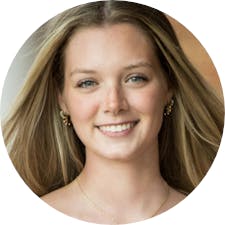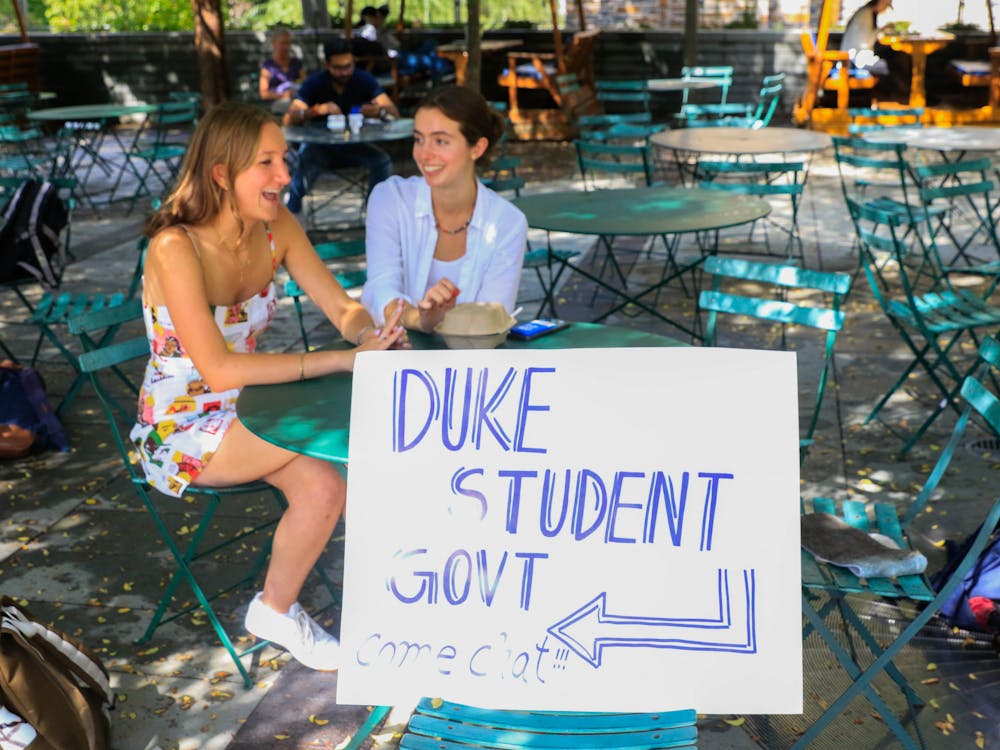When Lana Gesinsky, Trinity ’23 and former president of Duke Student Government, ran for the presidency in the spring of 2022, she said she wanted to usher in a “cultural reset” by strengthening community on campus and bringing DSG closer to the student body.
Gesinsky ran on a platform that worked to make DSG more transparent and responsive to the needs of Duke undergraduates through three tenets — community, clarity and communication.
“I am very proud of what DSG has accomplished this year. More people know what DSG is, what it does, and members have touched so many facets of Duke life and community,” Gesinsky wrote in an email to The Chronicle. “As always, DSG has much room to improve, but our increased communication, clarity and efforts for community are a step in the right direction.”
Although not every aspect of Gesinsky’s platform was realized, she believes that her “time was directed into other meaningful paths” and feels confident that new DSG leadership will continue to make progress on projects that were not completed during her term.
From tenting in Krzyzewskiville to weekly Pulse Checks on the Bryan Center Plaza, here’s how DSG’s actions over the past year stack up against what Gesinsky and DSG hoped to achieve in the 2022-23 school year.
Community
Through this tenet of her platform, Gesinsky aimed to “help create an approachable, fun, safe and supportive campus culture where everyone feels welcome.”
A key aspect of Gesinsky’s goal of building on-campus community was to “bring fun back to Duke.” She planned to do this by organizing a K-Ville watch party, opening a student-run bar or coffee shop, facilitating more open parties on campus and bringing back tailgating. She hoped to advocate for more open alcohol policies, including the purchase of alcohol with Duke funds.
DSG took significant steps this year to work towards shaping an on-campus social scene. In September, DSG approved new K-Ville tenting policies that removed the ban on tables and drinking games and formed the Committee on Safe Social Life in Durham to enhance “safety and inclusivity of off-campus events and selective organizations.”
In November, DSG, Student Affairs and the Student Organization Finance Committee collaborated to launch the QuadEx initiative Fun @ Duke, which facilitates the organization of social events on campus and funds alcohol for student group events. Gesinsky and former SOFC chair Hadrian Gonzalez Castellanos, Trinity ‘23, collaborated to create the alcohol funding legislation.
Fun @ Duke followed an October DSG survey that asked if students were in support of a new policy allowing student organizations to use their funds for alcohol, which was met with overwhelming support. However, some students expressed mixed reactions about the policy’s implementation and its impact on campus drinking culture.
DSG also provided students with tailgate information ahead of the first football game of the season in their first weekly email blast of the year. Gesinsky wrote that DSG also used social media to advertise tailgating and financed and coordinated watch parties and tailgate activities. DSG was not able to realize a student-run bar or coffee shop due to space and financial constraints, according to Gesinsky.
Another aspect of Gesinsky’s platform was to increase collaboration between DSG and Duke University Union to plan student events. Gesinsky wrote that DSG and DUU met monthly over her term to collaborate and discuss topics such as alcohol policies, sports events and use of the student activity fee. She hopes that the two bodies will continue their “strong relationship” in the future.
In addition to building community on campus, Gesinsky hoped to build relationships between undergraduate students and Duke alumni through the Blue Devil Buddies program, which she helped spearhead in 2020 in the midst of the COVID-19 pandemic. The program matches new Duke students with current students in one-on-one mentorships.
In her platform, Gesinsky hoped to work with Alumni Affairs to expand the program and offer mentorship relationships with alumni as well. While this project is “still in the works” and has not fully materialized, Gesinsky “remain[s] excited about it” and is “passing it down” to current DSG members.
As she looked to build community on campus, Gesinsky hoped to contribute to sexual assault prevention efforts on campus. She aimed to support the Center for Sexual & Gender Diversity, the Women’s Center and Sexual Harassment and Assault Prevention & Education, a student advocacy organization working to eradicate sexual violence at Duke.
In February, DSG introduced Lotus, “a new, confidential, support collective for students who have experienced gender-based discrimination, harassment, violence, or sexual assault.” The group was created and led by women of color and intended to provide a safe space for community-based healing.
DSG also introduced a new LGBTQIA+ Students Mental Health Support Group in February. The group was created in collaboration with CSGD and Duke Counseling & Psychological Services with the goal of building community and “foster[ing] stronger connections to campus resources.”
Gesinsky’s platform also mentions that “the last time Duke released sexual misconduct numbers was 2018 through the Student Experiences Survey,” and that “it is crucial the student body sees any new data and that we act on it immediately.” This survey was also included in SHAPE’s April demands.
New sexual misconduct data was not collected or released this year due to “circumstances out of [DSG’s] control” but is “anticipated to be released next year,” Gesinsky wrote. “DSG members have also continued to advocate for continued staff for Gender Violence Prevention & Intervention and hope to be involved in shaping the office over [the] next year,” she added.
Gesinsky’s platform also mentions demanding a “safe transportation option for students at later nighttimes.” DSG announced a new Late Night Lyft Van Program in March to meet this need.
Clarity
Through this tenet of her platform, Gesinsky looked to make DSG operations more clear and transparent.
Gesinsky aimed to hold a weekly Pulse Check, during which she would spend a few hours every week stationed on BC Plaza, in the Brodhead Center or at Marketplace to speak to students and answer their questions. Gesinsky wrote that she tabled on BC Plaza every Wednesday from 3 to 4 p.m during the fall semester and every Tuesday from 2 to 3 p.m. during the spring semester.
Gesinsky also wrote in her platform that she would provide students with a phone number that they could text in order to reach her with questions and suggestions. This phone number was sent out repeatedly in DSG’s weekly blast emails.
In addition, Gesinsky promised to reform DSG recruitment in order to make it more intentionally reflect Duke’s student body. To do this, DSG reformed the first-year election process, pushing back elections from the second week of school to just before fall break. Interested students were given the opportunity to shadow DSG Senate and committee meetings and attend coffee chats, open houses and information sessions with current senators.
DSG’s Equity and Outreach Committee also held an open house on East Campus in October in order to provide first-year students with the opportunity to talk to DSG senators and hear about their projects.
Under her goal to make DSG more transparent, Gesinsky also worked to designate a communications director to assist with outreach and transparency and personally reach out to and attend the meetings of interested student groups. Junior Reima Bash served as communications director under Gesinsky’s term, and Gesinsky wrote that current DSG leadership plans to expand the responsibilities of the role over the next academic year.
Her platform also emphasized increasing accessibility to open, physical space for student groups. She promised to “push for the space audit results to translate into tangible action, ensuring administration is reconsidering and repurposing spaces to reflect student use and need” and to work directly with the Center for Multicultural Affairs on space issues.
The CMA addressed DSG senators in October, updating them about the future of campus cultural spaces and a new Space Advisory Committee made up of students to provide feedback on renovation plans that affect cultural and affinity groups.
Gesinsky met personally with cultural and identity group leaders, and other members of the Executive Board met with CMA staff. Over the past year, “a designated Cabinet sub group” worked specifically on space issues, and it remains a “top priority” for the following academic year, Gesinsky wrote.
Through Fun @ Duke, students are provided with a guide that outlines how they are able to reserve physical spaces for gatherings on campus.
Communication
Through this tenet of her platform, Gesinsky worked to increase transparency with students and to “institute measures to help facilitate and encourage communication, consulting students at every turn.”
She proposed to help solve DSG’s lack of transparency by enabling student groups to nominate individuals to DSG Cabinet, giving Cabinet voting rights and allowing student groups to nominate optional liaisons to communicate with DSG.
Over Gesinsky’s term, DSG’s Cabinet structure was changed as described, but DSG “did not proceed with the liaison idea due to lessened interest and feasibility of the program,” Gesinsky wrote. Although the liaison program was not realized, she believes that the academic year was “one of DSG’s most diverse and representative years yet.”
Gesinsky aimed to “visit executive board meetings, offer casual coffees, or whatever else students request to engage with groups” in her platform. According to Gesinsky, she and other members of the DSG Executive Board reached out to student organizations to provide support or meet with student leaders throughout the year.
Gesinsky also aimed to increase communication between DSG and the student body by sending a summer survey to guide senators’ year-long projects and by advertising senators’ projects in DSG’s weekly blast emails.
In their first email of the year, DSG sent students a survey that they could fill out to help guide senators’ projects. The survey asked students for their input on the changes that they would like to see around campus.
Students were provided with updates on DSG senators’ projects during Project Town Halls held in March. All undergraduate students were invited to attend DSG Senate meetings in March to hear senate project presentations and provide feedback.
Gesinsky emphasized in her platform the importance of enabling students who are not a part of DSG to provide feedback on QuadEx. She and Ramya Ginjupalli, Trinity ‘22 and former DSG executive vice president, created a 2025 QuadEx Advisory Council during the 2021-22 school year, but did not create a similar council for the Class of 2026 “as administration was already doing similar things and it would have been redundant,” Gesinsky wrote.
DSG did not send out formal surveys or requests for student feedback on QuadEx during the past academic year because “administration formally released multiple efforts” to collect such feedback, Gesinsky wrote. QuadEx was, however, “a constant conversation with senators, students, and at [Gesinsky’s] pulse checks,” and the feedback gathered through these channels was communicated to administration.
Gesinsky also promised to advocate for swift action to solve the issue of mold in East Campus dorm rooms, and brought this issue up to administration during “meetings on University priorities,” she wrote.
For Gesinsky, nothing DSG did this year would have been possible without her Executive Board, which described as an incredible team filled with people “so eager and passionate about helping others.”
“DSG is by no means a one person job, and this team means the world to me. I am so excited for the future of Duke and DSG and am eager to look on from afar!” Gesinsky wrote.
Get The Chronicle straight to your inbox
Signup for our weekly newsletter. Cancel at any time.

Holly Keegan is a Trinity junior and a senior editor of The Chronicle's 120th volume.

